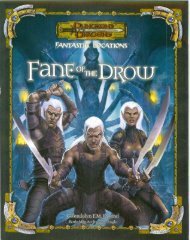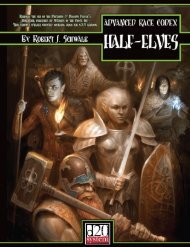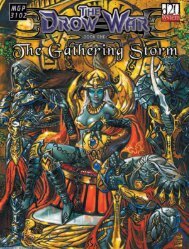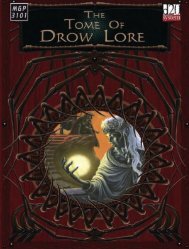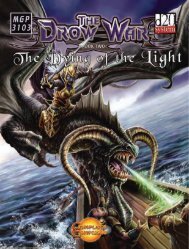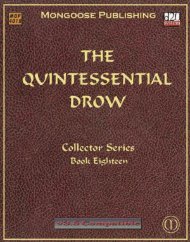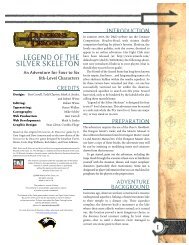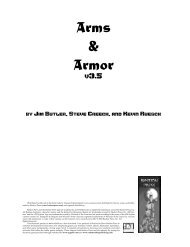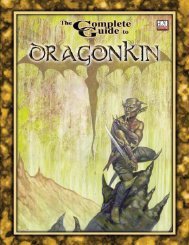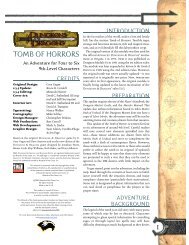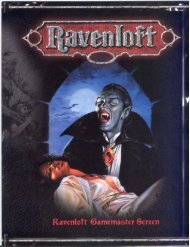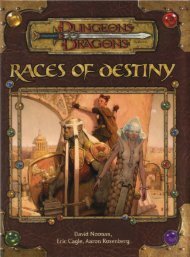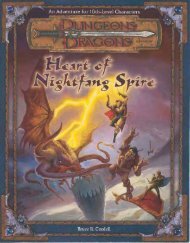Drow Magic. Sorcery Of Endless Night.pdf - RoseRed
Drow Magic. Sorcery Of Endless Night.pdf - RoseRed
Drow Magic. Sorcery Of Endless Night.pdf - RoseRed
Create successful ePaper yourself
Turn your PDF publications into a flip-book with our unique Google optimized e-Paper software.
BLACK CEREMONIES<br />
Black<br />
Ceremonies<br />
Even before they were cast down for their<br />
heresies against the elven gods, the elves who<br />
would become the drow were infamous for<br />
their wild reveries, orgies of blood and lust dedicated<br />
to celebration and worship of the primal forces of<br />
nature. As centuries passed and the worship of the Dark<br />
Mother of Spiders became more open and widespread,<br />
these reveries took on a more overtly religious tone.<br />
Guided by priestesses, the participants ecstatically<br />
worshiped their patron goddess, their writhing dances,<br />
bloodletting and feasts quickening the pulse of the earth<br />
and awakening dark, divine energies. The priestesses<br />
and priest mages of the church of the Dark Mother<br />
quickly learned to tap these energies for their own uses,<br />
to direct them to both power their spells and to work<br />
great magics which even the most powerful arcane<br />
and divine spells could not accomplish. Eventually<br />
the reveries became nothing more than elaborately<br />
structured rituals; perfected and codified in the Tome<br />
of Magnificent Ecstasies, they were used to ensure the<br />
growth of crops, to punish the enemies of the drow and<br />
to power great engines of war and death in the War of<br />
Elven Tears. It was during the last waning years of<br />
that cataclysmic war that the rituals earned the name<br />
the black ceremonies.<br />
The drow have not been lax during the long millennia<br />
of their entombment in the Dark Beneath, nor have<br />
they allowed knowledge of the Tome of Magnificent<br />
Ecstasies to slip into history. They have created new<br />
black ceremonies and refined the old, perfecting<br />
ceremonial magic to a degree which no other race<br />
can match. The performance of black ceremonies has<br />
become an integral part of day to day life and it is by<br />
their power alone that drow civilisation is able to keep<br />
its ravening hordes of enemies from tearing it apart in<br />
an orgy of blood and fire.<br />
Ceremonial <strong>Magic</strong>?<br />
Ceremonial magic is a relatively new concept in d20<br />
fantasy gaming, a method of spellcasting which is<br />
neither purely arcane nor divine, but rather a mixture<br />
of both. At its simplest, ceremonial magic is a method<br />
of commanding magic which is dependent on the<br />
successful execution of complex rituals designed to<br />
harness the raw power of reality itself.<br />
46<br />
Why Use Ceremonial <strong>Magic</strong> in Your<br />
Campaign?<br />
Whenever a Games Master is given the chance to<br />
integrate a new rules system into his campaign, the<br />
first question he must invariably ask is 'Why should<br />
I?' the second inevitably 'What will it accomplish?'<br />
To the first; the rules governing the use of ceremony<br />
magic presented here fill in a large gap in the<br />
existing fantasy gaming experience. The use of<br />
long rituals and elaborate ceremonies to create<br />
powerful magical effects is an idea that has gone<br />
relatively unexplored until now. Meaning that a<br />
Games Master who wished, for example, to close<br />
out an adventure with a confrontation with a group<br />
of drow attempting to chant down the sun was left<br />
to his own devices. While Games Master fiat is, of<br />
course, generally sufficient to resolve the issue, it can<br />
lead to dissatisfaction if the players come to resent<br />
what they see as ‘arbitrary’ decisions.<br />
As to the second question; the rules for ceremonial<br />
magic are largely intended to remove some of the<br />
burden from the Games Master. By laying out actual<br />
concrete guidelines for creating and performing<br />
ceremonial magic, the Games Master need no<br />
longer make up rulings on the fly. In addition,<br />
these rules open up new vistas for adventuring,<br />
providing a more mythic feel to your game. Ritual<br />
magic has long been a part of legend, folklore and<br />
more modern fantasy tales and now it can be a part<br />
of your game.<br />
Ceremonial magic is inspired loosely by ancient,<br />
real-world religious rites and more directly by fantasy<br />
fiction, where the idea that a group of like minded<br />
individuals can, with some effort and the proper<br />
materials, use their focused will to enact changes in the<br />
world around them. Unlike standard divine and arcane<br />
magic spells, which can only be wielded by a precious<br />
few, ceremonial magic can, in theory, be utilised by<br />
anyone, provided they can collect the proper materials<br />
and follow the proscribed steps. In practice, however,<br />
ceremonial magic works best when it is at least guided<br />
by someone with a solid understanding of magic – this<br />
is why most ceremonial magic is conducted by priests,<br />
witches covens, sorcerous cabals and the like.<br />
Mechanically, ceremonial magic is a system intended<br />
to supplement the spellcasting rules presented in<br />
Core Rulebook I. While the rules presented in that<br />
book do a good job of presenting rules usable by



